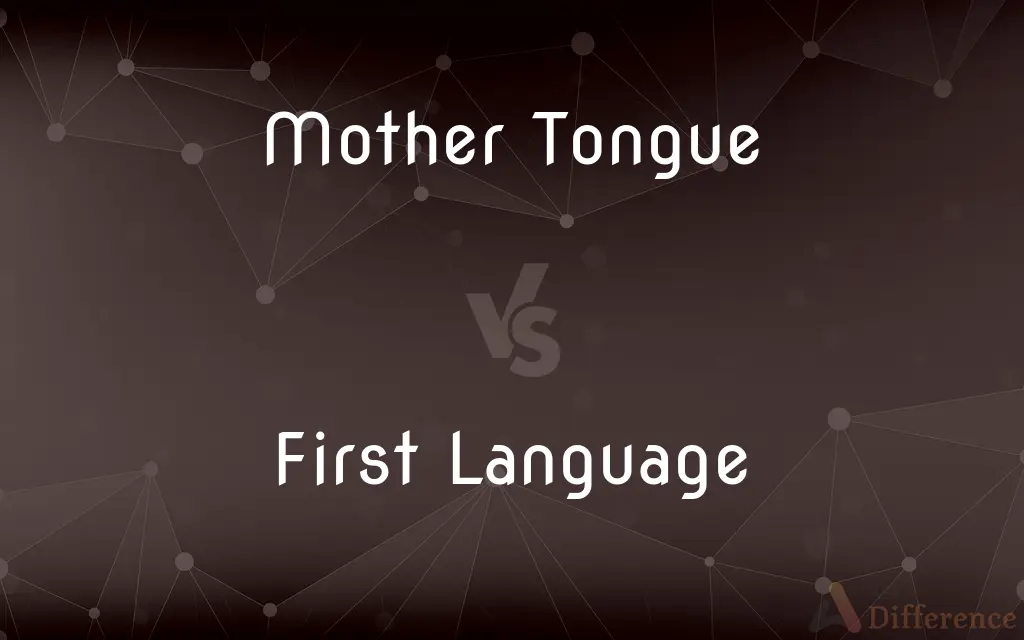Mother Tongue vs. First Language — What's the Difference?
Edited by Tayyaba Rehman — By Fiza Rafique — Published on October 31, 2023
Mother Tongue is the language spoken at home or learned from parents, while First Language is one's dominant language or the language learned as a child.

Difference Between Mother Tongue and First Language
Table of Contents
ADVERTISEMENT
Key Differences
Mother Tongue and First Language are terms that are often used interchangeably but can have nuanced differences.
Mother Tongue typically refers to the language one grows up speaking at home or learns from parents. It's the language of early exposure, holding cultural and familial significance. In many instances, Mother Tongue is the language through which one's earliest memories, stories, and traditions are shared. On the other hand, First Language is generally seen as the language a person learns first and is most proficient in. This can be the same as the Mother Tongue, but not always.
For instance, a child might grow up in a household where a certain language is spoken but could be educated primarily in another language. In such a case, while their Mother Tongue remains the language of their family, their First Language (in terms of proficiency and daily use) might be different.
Both terms underscore the importance of early language exposure, but First Language leans more towards proficiency, while Mother Tongue often has more emotional or cultural connections.
Comparison Chart
Definition
Language spoken at home or learned from parents.
Dominant language or language learned first as a child.
ADVERTISEMENT
Cultural Connection
Often carries cultural and familial significance.
Might or might not have a strong cultural connection.
Proficiency
Proficiency can vary.
Typically, one's most proficient language.
Emotional Connection
Often has deep emotional ties.
Connection could be more functional than emotional.
Examples
Languages of folklore, lullabies, etc.
Language of education, work, etc.
Compare with Definitions
Mother Tongue
The first language spoken in one's household.
Spanish is my Mother Tongue, as it's the language of my family.
First Language
The dominant language in terms of proficiency.
Although I spoke some French at home, my First Language is English.
Mother Tongue
Language learned from familial upbringing.
Even though I'm fluent in English, my Mother Tongue is Punjabi.
First Language
The language one is most comfortable expressing oneself in.
Though I know multiple languages, Spanish is my First Language.
Mother Tongue
The language of one's cultural roots.
Despite growing up in the US, I learned Tagalog as my Mother Tongue.
First Language
The initial language learned organically.
Mandarin is my First Language since it's the first I learned to speak.
Mother Tongue
Language through which cultural traditions are passed.
Every New Year, my grandparents tell stories in our Mother Tongue.
First Language
Often the language of schooling or education.
I was taught in German, making it my First Language.
Mother Tongue
The native language of one's ancestry.
Yoruba is my Mother Tongue, linking me to my ancestors.
First Language
The primary language someone learns and uses.
My First Language is English, as I learned it when I was a child.
Mother Tongue
(attributive) mother tongue
Common Curiosities
Why is Mother Tongue significant in cultural contexts?
Mother Tongue often carries traditions, stories, and values of a culture or family.
Is the Mother Tongue typically taught in schools?
It varies by region. Some places prioritize local languages; others might focus on global languages.
Is First Language always the language of education?
Not necessarily, but it often becomes the dominant language due to schooling.
Can First Language change over time?
Yes, migration, education, or work can shift one's dominant language.
Can Mother Tongue and First Language be different?
Yes, Mother Tongue is often familial, while First Language is about proficiency and dominant use.
Can someone have more than one Mother Tongue?
Yes, especially if multiple languages are spoken at home or by different family members.
Is it common for immigrants to shift their First Language?
It's possible, especially if they move at a young age and adapt to a new linguistic environment.
Are there benefits to being raised in a bilingual or multilingual household?
Yes, it can enhance cognitive flexibility, cultural awareness, and communication skills.
Can a person's First Language influence their accent in other languages?
Often, yes. Early language exposure can influence pronunciation in subsequent languages.
How does bilingual upbringing impact Mother Tongue and First Language?
Both languages can be Mother Tongues, but proficiency and usage might determine First Language.
Why is Mother Tongue education recommended in early childhood?
It aids cognitive development and maintains a cultural connection.
How can adults improve proficiency in their First Language?
Immersion, consistent practice, and engagement with native speakers can help.
Is it essential to preserve one's Mother Tongue?
Many believe it maintains a connection to heritage and identity.
Can learning a new language as an adult ever become a First Language?
Unlikely to replace the initial First Language, but proficiency can be achieved with dedication.
Can a person forget their First Language?
Rarely, but reduced use over time might decrease proficiency.
Share Your Discovery

Previous Comparison
Skeptic vs. Cynic
Next Comparison
Leukocytes vs. LymphocytesAuthor Spotlight
Written by
Fiza RafiqueFiza Rafique is a skilled content writer at AskDifference.com, where she meticulously refines and enhances written pieces. Drawing from her vast editorial expertise, Fiza ensures clarity, accuracy, and precision in every article. Passionate about language, she continually seeks to elevate the quality of content for readers worldwide.
Edited by
Tayyaba RehmanTayyaba Rehman is a distinguished writer, currently serving as a primary contributor to askdifference.com. As a researcher in semantics and etymology, Tayyaba's passion for the complexity of languages and their distinctions has found a perfect home on the platform. Tayyaba delves into the intricacies of language, distinguishing between commonly confused words and phrases, thereby providing clarity for readers worldwide.












































